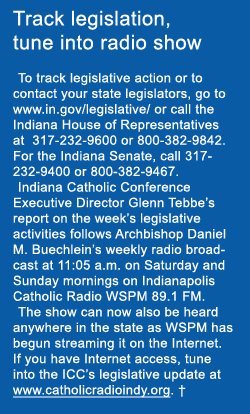Abortion, home heating advance to conference committees

By Brigid Curtis Ayer
As this newspaper went to press, the Indiana General Assembly was set to adjourn on March 14, and politics at its best—and worst—can be seen in the waning days of the Indiana General Assembly. It is often heightened during a process called the conference committee.
Followed and understood mainly by Statehouse insiders, this fast-paced, often convoluted mayhem leaves even the legislatively inclined feeling baffled.
This year, like others, is no exception. And in the case of controversial issues such as abortion—especially leading up to an election year when political stakes are higher—it ups the ante of political bargaining, a key component of the conference committee process.
 House Bill 1172, a priority bill for the Indiana Catholic Conference, illustrates the conference committee process. The bill would add more information for women seeking abortion under Indiana’s informed consent law.
House Bill 1172, a priority bill for the Indiana Catholic Conference, illustrates the conference committee process. The bill would add more information for women seeking abortion under Indiana’s informed consent law.
The version of the bill, which passed the Indiana House of Representatives with bipartisan support by a 70-30 vote, did five things—before it went into conference committee. It informed women considering abortion: 1) that life begins at fertilization; 2) that the fetus may feel pain during the abortion; 3) that after 20 weeks of gestation, since the fetus may feel pain, an anesthetic for the fetus may be available; 4) that written information be provided on physical risks of abortion; and 5) that written information on adoption alternatives be given.
A conference committee is made up of two members from both the House of Representatives and Senate, appointed by the presiding officers. A bill goes to conference committee upon refusal of the first chamber to concur in the amendments adopted by the second chamber.
Since House Bill 1172 was amended in the Senate, the bill’s author has the option to agree or concur with the amendments or to disagree, thus dissenting with the amendments. If the author dissents, then a conference committee must meet and attempt to prepare a version of the measure acceptable to both houses.
“Since Rep. [Tim] Harris [R-Marion], the bill’s author, decided not to concur, the bill moved to a conference committee,” said Glenn Tebbe, executive director of the Indiana Catholic Conference.
The conferees for House Bill 1172 were Harris; Sen. Jeff Drozda (R-Westfield), Senate sponsor of the bill; Rep. Earl Harris (D-East Chicago); and Sen. Allie Craycraft (D-Selma).
“While these meetings are public, many unofficial discussions occur,” Tebbe said. “Some may be between two legislators or others may be a one-on-one discussion between a legislator and lobbyist.
“Sometimes it takes more than one conference committee meeting to come up with a final report,” Tebbe added.
“Another challenge is once a conference committee report has been agreed upon by the conferees, then leadership must approve of the contents and wording before it can go to the floor for a vote.”
Two reports were offered during a March 8 conference committee by Harris for consideration to determine if either could receive sufficient support. One report included: 1) that the fetus might feel pain; 2) that “physical life” begins at fertilization; and 3) the Senate version of House Bill 1080 regarding abortion facilities.
A second report offered by Harris added a provision that would allow pharmacists to refuse to dispense an abortifacient. The representative decided to go with the first report since language in the second report—“dispense an abortifacient”—was a new concept that had not passed either the House or Senate and would have created more opportunity for opposition from legislators.
The home heating issue, also a priority for the Indiana Catholic Conference this year, may have found a safe harbor in a conference committee report. Earlier this session, House Bill 1081, the energy sales tax exemption for persons receiving heating assistance, passed the House. However, in the Senate, the bill was amended into House Bill 101, the state’s controversial property tax bill.
“Since the two chambers are far apart on resolving differences in the two versions of House Bill 101, the bill’s sponsors sought another place to put the sales tax exemption,” Tebbe said.
“They found Senate Bill 258, a bill which deals with sales tax for recreational vehicles,” Tebbe continued. “Sponsors are hopeful that they can include the home heating tax exemption language into the conference committee report for Senate Bill 258.”
Language providing a food handling exemption for non-profits, which was removed from two bills in conference committee, has found another home in House Bill 1235, a bill dealing with a similar topic. This report has been signed by conferees. If approved by the House and Senate and signed into law, the conference committee report on House Bill 1235 would give churches, schools and other non-profits a food handling exemption until 2010.
After a conference committee report is approved by leadership in both the House and Senate, it is eligible to move forward to the House and Senate floor for a vote.
(Brigid Curtis Ayer is a correspondent for The Criterion.) †
 House Bill 1172, a priority bill for the Indiana Catholic Conference, illustrates the conference committee process. The bill would add more information for women seeking abortion under Indiana’s informed consent law.
House Bill 1172, a priority bill for the Indiana Catholic Conference, illustrates the conference committee process. The bill would add more information for women seeking abortion under Indiana’s informed consent law.